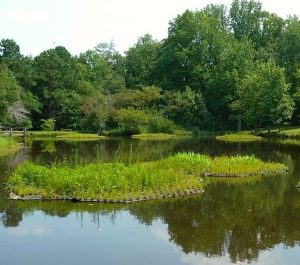Clemson to lead $8.7 million research effort on nursery water supply, use
December 4, 2014CLEMSON — The Department of Agriculture has awarded Clemson researchers $8.7 million to lead a multistate, five-year project to help ensure sufficient water for the nation’s billion-dollar nursery and floriculture industry.
Regional water shortages and droughts are creating competing needs among metropolitan and rural areas. Innovative approaches to use water more efficiently can help address the allocation problems.
Twenty-one researchers at nine universities across the nation will collaborate to design and demonstrate ways to treat and recycle water. The title of the grant is “Clean WateR3 – Reduce, Remediate, Recycle – Enhancing Alternative Water Resources Availability and Use to Increase Profitability in Specialty Crops, funded by the USDA Specialty Crop Research Initiative.”
Clemson scientists include ecological engineer Dan Hitchcock at Clemson’sBaruch Institute of Coastal Ecology and Forest Science in Georgetown and Clemson Extension nursery specialist Sarah White, who focuses on water-cleansing techniques and is the project director. Both are associate professors in Clemson’s School of Agricultural, Forest and Environmental Sciences.
“Our work will help producers of nursery and floriculture crops in containers obtain and retain reliable, alternative sources of water to decrease dependence on potable water and enhance their long-term economic viability,” White said.
The water-dependent industry includes more than 21,000 businesses nationwide that raise and sell plants, flowers, seeds and foliage, accounting for $11 billion in sales in 2009, the most recently reported USDA statistics.
In South Carolina there are more than 200 nurseries and floriculture operations. The S.C. industry in 2009 tallied more than $135 million in sales. The nursery and greenhouse industry comprises the fastest growing segment of U.S. agriculture, according to the USDA’s Economic Research Service.
The water that nurtures the plants can contain contaminants, such as pesticides, salts and harmful microbes. What’s needed are ways to filter the water, making it usable again and environmentally safe.
Researchers will investigate water treatment techniques.
Hitchcock specializes in using plants for water quality improvement. Ecological engineers design and build biological systems, such as treatment wetlands and planted buffers, in which plants take up pollutants through their roots, then store, neutralize or metabolize them.
“It really comes full circle — and makes sense — to use plant materials to treat water for reuse in a plant-production operation,” Hitchcock said.
Hitchcock’s Georgetown partnerships create an opportunity to work with S.C. businesses. Parsons Nursery, a wholesaler in Georgetown that already runs an optimal operation, will allow the researchers to test new water treatment technologies on site.
In the Upstate, Head-Lee Nursery, a retailer in Seneca, will work with White.
Nurseries can work with plant propagation, growing out plants or retail sales. Some growers specialize in one type of plant, such as bulbs, shrubs or shade trees. Others grow bulk stock, such as fruit trees for orchards and timber trees for forestry. Some produce seasonal plants, including poinsettias, Christmas trees, tulips and Easter lilies.
Garden and landscaping plants are the industry’s best-known products, but nurseries have a more far-reaching importance in agriculture, forestry and conservation biology. The industry’s growers are typically conservation-minded and know that protecting water quantity and quality can also save growers money.
Other universities collaborating on the project are: Virginia Tech, the University of Maryland, Michigan State University, the University of Kentucky, the University of Florida, Texas A&M University, Oregon State University and the University of California-Davis .





















